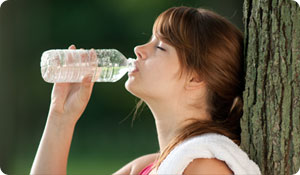
You've been told your whole life that you need your eight glasses of water a day, and while how much one needs to take in is still up for debate, the truth remains that for optimal functioning, the body needs a consistent intake of water.
For the average person, thirst should be your guide. If you're feeling like you could wet your whistle, do so. But make sure you reach for H20, and not an overly sugary, caffeinated beverage. This will only exacerbate your thirst. Keep in mind that fluids can be obtained not just from water but also foods that are high in water, like fruits and vegetables.
But what if you're an athlete or an avid exerciser? Does this mean you need to take in additional fluids? The long and short of it—yes.
The body loses about two to three quarts of water every day. If you're exercising, the loss can be much more.
1. Start your morning with a cup of H20. A six to eight hour stint without fluids can leave you groggy and tired. Kick your day off with a glass of water instead of coffee.
2. Hydrate all day long. The key to ensuring your hydration when you're exercising is by taking in fluids all day long. Continue your fluid intake throughout the day. This will keep your body running at the highest level.
3. Drink two or more hours before you exercise. This will allow time for your body to process the fluid.
4. Drink again a few minutes right before you begin your activity.
5. Drink periodically during your workout. If you've been hydrating properly throughout the day, taking "baby sips" should suffice. Long gulps of water can leave you feeling bloated and uncomfortable. If you're playing a sport, at halftime reach for an orange. They're delicious and packed with fluid.
6. Make sure you hydrate properly after you've finished. The biggest mistake an athlete can make is to neglect post-game refreshment. After a strenuous workout, your body loses a considerable amount of water and electrolytes. Replenish them with a low-sugar sports drink or good old H20.
7. Avoid too much water. Yes, when it comes to water, there can be too much of a good thing. Drinking too much water in a short period of time, gallons within hours, can result in hyponatremia, a dangerous condition sometimes seen in endurance athletes. Symptoms include headache, muscle weakness, convulsions, and even death. To reduce the risk of hyponatremia and water intoxication, limit fluid intake during times of heavy sweating between four and six cups of water per hour.





